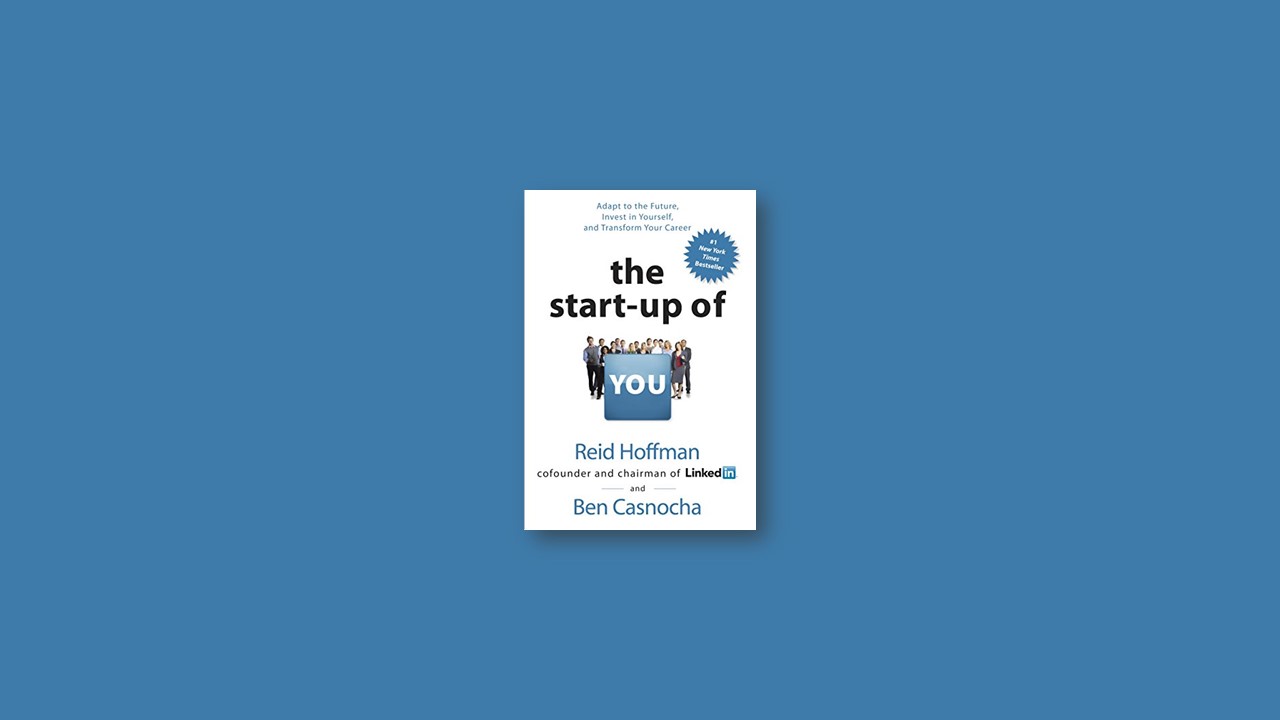Why the Start-Up of You
With change come new opportunities as well as challenges. What’s required now is an entrepreneurial mind-set. Whether you work for a ten-person company, a giant multinational corporation, a not-for-profit, a government agency, or any type of organization in between—if you want to seize the new opportunities and meet the challenges of today’s fractured career landscape, you need to think and act like you’re running a start-up: your career.
Why the start-up of you? When you start a company, you make decisions in an information-poor, time-compressed, resource-constrained environment. There are no guarantees or safety nets, so you take on a certain amount of risk. The competition is changing; the market is changing. The life cycle of the company is fairly short. The conditions in which entrepreneurs start and grow companies are the conditions we all now live in when fashioning a career. You never know what’s going to happen next. Information is limited. Resources are tight. Competition is fierce. The world is changing. And the amount of time you spend at any one job is shrinking. This means you need to be adapting all the time. And if you fail to adapt, no one—not your employer, not the government—is going to catch you when you fall.
Entrepreneurs deal with these uncertainties, changes, and constraints head-on. They take stock of their assets, aspirations, and the market realities to develop a competitive advantage. They craft flexible, iterative plans. They build a network of relationships throughout their industy that outlives their start-up. They aggressively seek and create breakout opportunities that involve focused risk, and actively manage that risk. They tap their network for the business intelligence to navigate tough challenges. And, they do these things from the moment they hatch that nascent idea to every day after that—even as the companies go from being run out of a garage to occupying floors of office space. To succeed professionally in today’s world, you need to adopt these same entrepreneurial strategies.
They are valuable no matter your career stage. They are urgent whether you’re just out of college, a decade into the workforce and angling for that next big move, or launching a brand-new career later in life. Companies act small to retain an innovative edge no matter how large they grow. Steve Jobs called Apple the “biggest start-up on the planet.” In the same way, you need to stay young and agile; you need to forever be a start-up.
The Start-up of You Mind-set: Permanent Beta
Technology companies sometimes keep the beta test phase label on software for a time after the official launch to stress that the product is not finished so much as ready for the next batch of improvements. Gmail, for example, launched in 2004 but only left official beta in 2009, after millions of people were already using it. Jeff Bezos, founder/CEO of Amazon, concludes every annual letter to shareholders by reminding readers, as he did in his first annual letter in 1997, that “it’s still Day 1” of the Internet and of Amazon.com: “Though we are optimistic, we must remain vigilant and maintain a sense of urgency.”19
In other words, Amazon is never finished: it’s always Day 1. For entrepreneurs, finished is an F-word. They know that great companies are always evolving.
Finished ought to be an F-word for all of us. We are all works in progress. Each day presents an opportunity to learn more, do more, be more, grow more in our lives and careers. Keeping your career in permanent beta forces you to acknowledge that you have bugs, that there’s new development to do on yourself, that you will need to adapt and evolve. But it’s still a mind-set brimming with optimism because it celebrates the fact that you have the power to improve yourself and, as important, improve the world around you.
Andy Hargadon, head of the entrepreneurship center at the University of California–Davis, says that for many people “twenty years of experience” is really one year of experience repeated twenty times.20
If you’re in permanent beta in your career, twenty years of experience actually is twenty years of experience because each year will be marked by new, enriching challenges and opportunities. Permanent beta is essentially a lifelong commitment to continuous personal growth.
Get busy livin’, or get busy dyin’. If you’re not growing, you’re contracting. If you’re not moving forward, you’re moving backward.
Plan Z: Jump on Your Lifeboat and Regroup
The reason many people do not embrace trial and error, learning by doing, adaptation, and the other themes of this chapter is because these strategies introduce real uncertainty. It’s easy to say “learn by doing”—but what if you’re not sure what you’ll learn or what you should do?
uncertainty never goes away. Fear of failure never goes away. The way to feel comfortable with these entrepreneurial strategies is to have one plan in your life that’s highly certain. That’s Plan Z: a reliable plan you shift to when you no longer have confidence in Plan A and B, or when your plans get severely disrupted. The certainty of the Plan Z backstop is what enables you to be aggressive—not tentative—about Plans A and B. With a Plan Z, you’ll at least know you can tolerate failure. Without it, you could be frozen in fear contemplating the worst-case scenarios.
Build Genuine Relationships
Old-school “networkers” are transactional. They pursue relationships thinking only about what other people can do for them. And they’ll only network with people when they need something, like a job or new clients. Relationship builders, on the other hand, try to help other people first. They don’t keep score. They’re aware that many good deeds get reciprocated, but they’re not calculated about it. And they think about their relationships all the time, not just when they need something.
True relationship building in the professional world is like dating. When you’re deciding whether or not to build a professional relationship with someone, there are many considerations: whether you like him or her; the capacity for the person to help you build your assets, reach your aspirations, and position you well competitively, and for you to help back in all the same ways; whether the person is adaptable and could help you adapt your career plan as necessary. And, like with dating, you should always have a long-term perspective.
Mind on Fire: Be Curious
When your eyes are open and your mind is curious, you can do things that dramatically increase your opportunity flow, such as tap networks of people, court selective randomness, and see opportunity amid hardship.
Andrew Mason did not wake up one day and conceive Groupon; the opportunity grew out of his ongoing activities and ideas. Clooney did not move to Hollywood and the next day land the ER gig. He invested twelve years of continuous effort. To cultivate, identify, and generate an opportunity takes ongoing investment.
So even if you don’t have an immediate reason to actively look for an explicit opportunity—even if, say, you’re happily employed and stimulated—it’s important to keep generating professional opportunities anyway. Partly this builds opportunity muscle memory: the more you try, the more you strengthen your intuitive sense of how, where, and why opportunities enter your career. Partly it’s because you never know when you’ll have to pivot to Plan B and go after a new opportunity.
Assessing and Managing Risk
Learning how to accurately assess the level of risk in a situation isn’t easy, for a few reasons. First, risk is both personal and situational. What may be risky to you may not be risky to someone else. There are people for whom quitting a job before having another one lined up is unacceptably risky; for others, it’s a fine proposition. There are people who forego earning income for several months to start their own companies; others wouldn’t dream of putting themselves in a situation where they aren’t guaranteed a steady salary and benefits.
What’s more, risk is dynamic. You are changing, the competition is changing, the world is changing. What may be risky to you right now may not be a month or year or five years from now. What’s the risk of ruffling your colleagues’ feathers if you lobby aggressively for a lead role on a project? It depends on murky factors that are always in flux. If you just got a raise and upgrade to your title, for example, it’s a different calculus than if you’re new on the job. Nothing is universally risky or not risky; it’s a matter of degree and it various tremendously based on situation and personality.
Navigate Professional Challenges with Network Intelligence
Entrepreneurs navigate the day-to-day issues of running a company by gathering intelligence: actionable, timely information on all facets of their business, including industry trends, opportunities, competitors’ activities, customer sentiment, promising young talent, and sales trends. In a business, intelligence serves as a GPS device.
You need good intelligence to run the start-up of you. You get it by talking to people in your network. It’s people who help you understand your assets, aspirations, and the market realities; it’s people who help you vet and get introduced to possible allies and trust connections; it’s people who help you track the risk attached to a given opportunity. We is the formula for gathering the kind of information that will help you navigate professional challenges.


